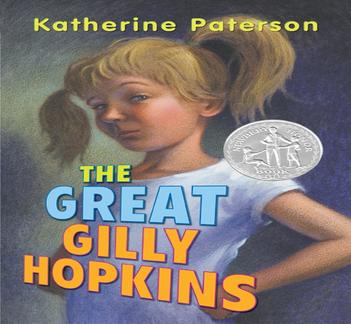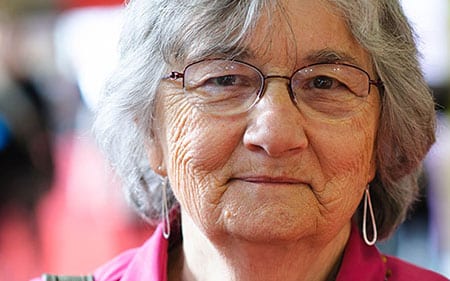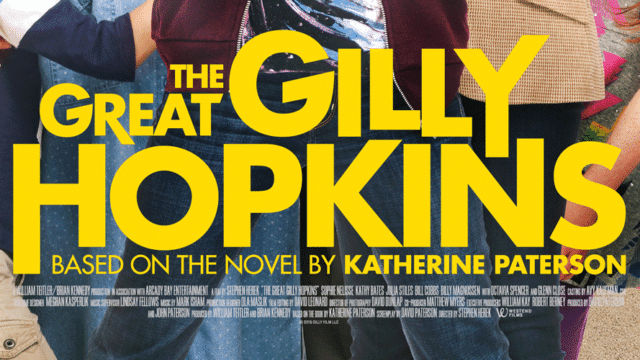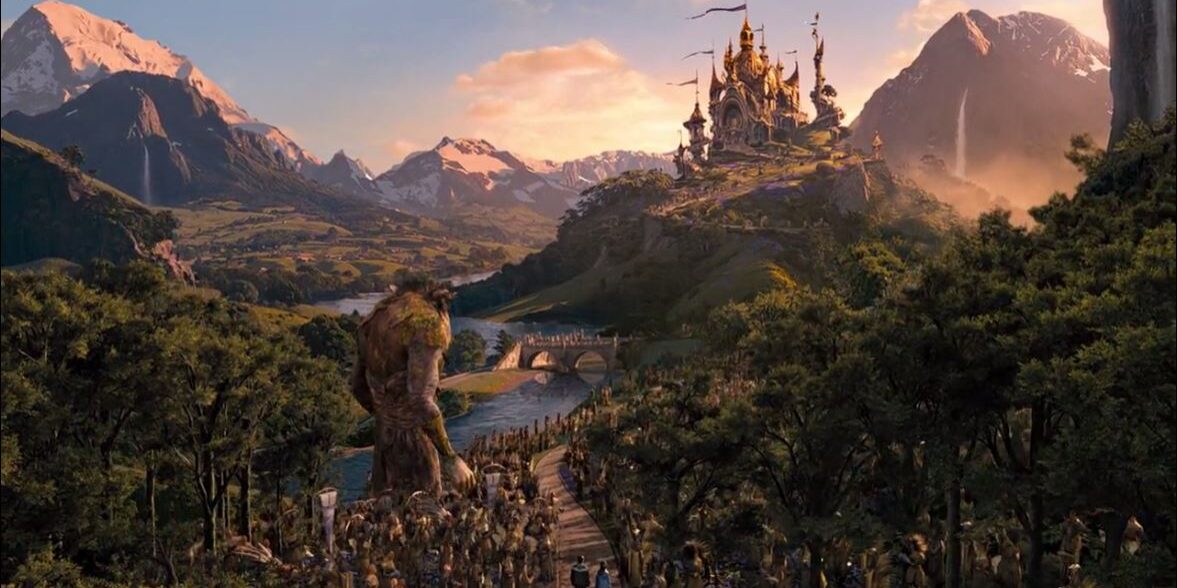For many readers, stories written by Katherine Paterson reach deeper into the human heart than those of any other author. At first glance, her books like Bridge to Terabithia seem to be simple children’s literature. Yet they take us spelunking into experiences that we all share as humans, but often fear to express – from grief and loss to glowing hope.
This fall, Paterson’s The Great Gilly Hopkins finally made it to the big screen, and released on DVD this week. It’s a moving story for children of all ages, simple and ultimately heartwarming – winner of the 1979 Newberry Honor and the National Book Award, and has been translated into 19 languages.
But for foster and adoptive parents, social workers and others child advocates, the film is also more. Gilly Hopkins offers an opportunity to invite friends and the broader culture to think seriously about children in foster care… and perhaps even consider what it might look like to get personally involved.
Not long ago, I had the privilege of discussing life, faith and Gilly with Paterson:

Katherine: I had real fear as a child when World War II began. When we moved from China to this country, I knew what it felt like to be outside. If you look at my books…they are about children who are outside for whatever reason. And those are the children I care about and write about. I want those children to know they aren’t alone.
That’s why in Gilly Hopkins I gave Gilly the most wonderful foster brother I could create. One that truly loves as God loves — loves her as she is and makes it possible for her eventually to love herself and to reach out and love other people.
Jedd: Beautiful. So what inspired you to write a novel that is rooted in the United States foster system?
Katherine: Oh, well that’s a confession of sin, Jedd. My husband and I, we have four children. Two adopted and two homemade. And many years ago – because we had two adopted children, we were asked to take in two brothers in an emergency situation. It was actually at the time when Vietnam and Cambodia fell and these kids landed at the Dulles airport with just their name tags around their necks. And the government just didn’t know what to do with them, so they asked foster care organizations in the DC area to find some foster homes until immigration could figure out what to do.
And I thought, We have four kids, six kids isn’t a big deal. Boy, did I find out differently. Of course, the boys had difficult problems in this transition. But I realized I also was the problem. I was thinking (and I never said it out loud, thank goodness), Well I can’t deal with that problem because they’re only going to be here for a short time, or Thank heaven they’re only going to be here for a short time.
I was treating two human beings as though they were disposable. And I was so deeply ashamed when I realized that.
And I realized that what I was doing was treating two human beings as though they were disposable. And I was so deeply ashamed when I realized that. Because you know, I thought of myself as a pretty nice person. But, here I was doing what causes people to commit crimes and start wars – I was treating other human beings as though they were disposable.
And I had to think about what I would feel like if I thought people regarded me as disposable. I decided I would be very angry. Which, you know, of course, is where the character of Gilly Hopkins starts.
Jedd: You’ve expressed that you feel the best writing always delves into those deep places of our own hearts. Do you feel like in some ways that’s what you were doing with Gilly, as well as her foster brother, William Ernest?
Katherine: Oh yes, oh yes. I identify with both Gilly and Ernest really. They’re both parts of my personality. When I was a child and people were disrespecting me and treating me as though I were nothing, I just wanted to go away and hide like William Ernest did, I didn’t want to have to fight that.
It’s not nearly so much now. I’ve realized there are a lot of people in that room that feel the same way I do. We’re all shy children – or many of us, shall I say – and so it’s much easier for me to think of myself as not the only fearful child in the room.
If you’re not willing to go into your deepest self and share that self with the reader then you can’t expect them to share their deepest self with you.
When I’m talking to people who want to write I say, if you’re not willing to go into your deepest self and share that self with the reader then you can’t expect them to share their deepest self with you. It’s when we make connections because what’s deep inside us is meeting what’s deep inside the reader. People ask what’s the best thing about being a writer and I say that it’s having readers because it’s just such a wonderful feeling when someone is connecting with you on that deep level.
Jedd: So, jumping back a moment to your experience with those two boys that you fostered – you’ve shared before that you went into fostering feeling pretty good about yourself as a mom, maybe a solid “B- mom” is what you wrote, and then as you got deeper into fostering you started feeling like a total failure. I think there are a lot of adoptive and foster parents who go through those feelings. What would you say to a mother who is seeking to love children who have come from very hard places and she’s feeling like a failure?
Katherine: First of all, how brave you are, because most people wouldn’t dare to do this in the first place. You’ve dared to do something that is terribly hard. You’ve got to recognize that… [It’s] a hard, hard, hard task. And I know it because I only had to do it for two months and I didn’t do it well, although I was so touched.
I was at a national book festival two years ago and there was this autograph line. Finally this very tall, very handsome Asian gentleman made it to the front and he said “Mrs. Paterson, I’m Thao!” He was one of the boys from foster care! I was just so touched that he remembered me and wanted to speak to me. We hugged each other. I hadn’t seen him since he was this darling little 6-year old.
Jedd: What a moment! The work of foster care is so different than other ways of loving children or other service. It’s not like going like to a soup kitchen for two hours. It’s 24-hours a day, bringing a child into your very private spaces. How does your Christian faith shape your view of this?
Katherine: It does make you realize in a rather dramatic fashion that we’re all God’s adopted children. He only had one begotten Son, and the rest of us are all adopted and chosen by God to be loved. He still puts up with exactly who we are and He still loves us. So, isn’t that a miracle?
It does make you realize in a rather dramatic fashion that we’re all God’s adopted children. He only had one begotten Son, and the rest of us are all adopted and chosen by God to be loved. He still puts up with exactly who we are and He still loves us. So, isn’t that a miracle?
Jedd: Yes, indeed! Gilly’s foster mom, Trotter – she is remarkably unimpressive at first glance. She lives in a small messy house, she’s kind of frumpy. But it’s that unimpressiveness that’s one of the most inspiring aspects of the story. Trotter shows us that the most ordinary people can make an extraordinary difference in other’s lives through perseverant love. Tell us a little more about Trotter and why you created her the way you did.
Katherine: Years ago, I was at going to be speaking at an event, and I was being led by one arm towards the podium because everything was running a little late. And a young woman jumped out of the aisle – I think she was from the University of Chicago – and she grabbed my other arm and said, “Wait, wait, wait! I have to ask you a question. I’m doing a doctoral thesis on southern settings for children’s books and I have to know who Maime Trotter is.”
And the woman who was trying to lead me to the platform was grabbing my other arm, and as I was being led away I said, “God!”
The young woman from the University of Chicago gave me this look, and I thought, “Well, I can’t tell if they believe in God at the University of Chicago, but I’m sure they don’t think God speaks with a southern accent.” [Laughs]
You know, really what I was trying to do in Maime Trotter was to say, “This is the way God loves.” He loves us as we are, and because He loves us the way we are then eventually there’s a hope that we might become what we ought to be and what He means for us to be in our fullness – fully human, healthy and whole and loving.
This is the way God loves. He loves us as we are, and because He loves us the way we are then eventually there’s a hope that we might become what we ought to be and what He means for us to be in our fullness – fully human, healthy and whole and loving.
Jedd: Katherine, what do you feel children in foster care most need?
Katherine: Gosh, they need love. And the kind of love that has boundaries. It’s not “anything goes,” but they need a loving structure for their lives which up until that point in their lives has probably been totally chaotic and unloving. Does that makes sense?
Jedd: Yes, definitely. I very much agree. Have you received criticism for your books?
Katherine: I’ve sometimes been attacked by people who describe themselves as Christians, Jedd, for Gilly Hopkins. Mainly because of her language…One lady, knowing that my father was a conservative Christian missionary, said to me very sternly, “What did your father think of this book?” And I said, “Well, of all my books that he read, Gilly was his favorite.”
And I was so naughty, I just couldn’t help but add, “But of course, he’s read the story of the prodigal son.” To me, Gilly is a story of redemption and I thought that’s what we were all about. [Laughing]
Jedd: Amen Katherine. Yes. I feel like nothing is more disheartening and disappointing than encountering Christians who don’t share the heart of Jesus, and nothing is more beautiful than people who do.
Katherine: You’re gonna make me cry, Jedd. [Wiping her eyes.] That’s a wonderful message.
Jedd: In my work, I get the privilege of working with people all over the United States – and increasingly around the world – who are saying, “As Christians we are called to be God’s answer for orphaned and vulnerable children.” Some are living that out in adoption, some in foster care, some mentoring, some trying to reunite broken families. But, it is so beautiful. So even though I of course encounter many very sad distortions of Christianity in the world, in my daily work I see some of the purest expressions of it. The pure religion that James talks about.
Katherine: That’s wonderful.
Jedd: It’s really a gift to get to be a little part of this work. If you’re willing, I’d love to hear a bit more about your journey with adoption, too. What part did your Christian faith play in your own decision to adopt?
Katherine: Well, my husband and I decided before we were married that the world had an awful lot of children that needed homes, and we would just sort of plan our family that we would have two children and adopt two children.
I had been a missionary in Japan and I had seen so many mixed race American/Japanese children that were living a very unhappy life in orphanages because no one wanted them in Japan. My Japanese was still good at the time, so we thought we would try to adopt one of those children. I had visited these orphanages and it just broke my heart for these children to grow up without loving homes.
So soon after we were married, within a few weeks, I wrote to a social worker friend in Japan to ask how to go about that. She said that unfortunately the Japanese government had just made a law that unless one of the parents was Japanese these children could not be adopted. I thought, Well then, they’ll never be adopted because that’s not the kind of adoption the Japanese would normally do. There was a lot of racial prejudice – who will adopt mixed-race children?
My friend suggested we work through a different agency that was doing adoptions from Hong Kong and Korea at the time. And of course I had a Chinese background [growing up in China as a missionary kid], so we began to work to seek a Chinese child, and that’s how we got our older daughter.
I also have a beautiful 48-year old daughter now who is half Apache. I would give anything in the world for my two daughters and I was a little terrified for awhile [when they were little] that someone was going to come and take my baby back to the reservation. But that never happened. She has gone back and met her relatives there. She ultimately decided she wanted to be a Paterson, but that’s a long story.
Jedd: Thanks for sharing that, Katherine.
Katherine: I had a call some years ago from a woman who was writing a book on the adoption of Native American children by white people and she said she wanted to interview me. I said, “I think the person you should interview is my daughter.” I asked Mary if she ever called her and she said, “Yeah, I told her I love my parents and I was really fortunate that I had been adopted, and after that she didn’t want to talk to me anymore.”
Jedd: It does often seem that the stories of greatest angst are the ones that get the most notice.
Katherine: I don’t mean there were never any problems. You have an adopted child and homemade children and…there are always problems with children, Jedd, aren’t there? No matter where they come from. Just thank God you get through them all.
You have an adopted child and homemade children and…there are always problems with children, Jedd, aren’t there? No matter where they come from. Just thank God you get through them all.
Jedd: Yes, indeed! Well, one other question here. What are your hopes for the Gilly film?
Katherine: I hope it’s going to sp
Jedd: I really want the world to see it, too, Katherine. I want people who care about these things not only to see it themselves but also use this as an opportunity to invite others into conversation about kids in foster care and other kids that are often forgotten.
Katherine: The conversation will be almost as valuable as the film itself – I want people to talk with each other about things that strike them in the film, or that worry them, or that they want to share or debate or whatever. I just think that conversation will be important. We need to talk to each other in this country.
Jedd: Amen to that. More than ever, yes. Thank you for this this conversation, Katherine. I’ve really valued this time together.
Katherine: It’s been lovely – and I’m wiping the tears off my face. I don’t think of myself as a weepy person but…I’m wiping my tears behind my glasses.

